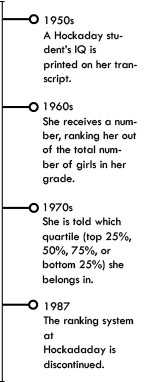
Administrators in 1987 made a decision that, as a highly selective independent school, rankings would further divide the school and drive competition to unhealthy levels.
“Because [our] talent pool is small and carefully selected, we have already sort of made that slice through the admissions process,” Director of College Counseling Carol Wasden said. “We’ve picked out the best and the brightest already, and to further draw distinctions between them is probably not relevant.”
Head of Upper School John Ashton said that school administrators do not believe a ranking system would benefit students in any way.
“We don’t think its serves our girls well if we narrow success down to such a limited view,” he said. “Not having the rank creates an environment that at least softens the competitive environment.”
A public ranking system in which each student’s rank is public knowledge, he said, could change the driving motivations behind a student’s success. Rather than striving to do her personal best, a student might strive to hold a high ranking.
“When schools start to publically rank, it fosters this environment of ‘who can I be better than’ without having a functional purpose,” Ashton said.
Junior Melody has observed the effects public ranking systems have on a student body because she has several friends who attend Plano West Senior High School.
“People who are not in the top 10 will do like whatever it takes [to make it there],” Melody said. An exclusive community of sort can form among those ranked highly, making others who don’t make the cut feel “less worthy.”
Shomik, a sophomore at Plano East Senior High School, said the ranking system at his school provides some benefits as well as disadvantages. Class ranking at Plano East is determined by the raw, cumulative grade point average score and a student is individually notified of his or her rank at the end of each semester.
“[The ranking system] can serve as a motivational tool for each student,” Shomik said. “There are certain students who need this incentive to perform well.”
Shomik, however, also acknowledges the negative impacts of this system.
“It can be a little discriminatory, and it can break up friendships or other relationships because some people might start to feel superior,” he said.
The rankings at Plano East also do not take a student’s electives or extracurriculars as much into consideration.
Those who participate in electives are not given precedence though they “work equally as hard as the people who are only trying to get a better rank,” Shomik said. “They have a split focus versus those who solely focus on grades.”
At the same time, sometimes a high rank might be able to offset a low SAT score, Ati added.
During the college admissions process, Wasden acknowledged that some Hockaday students do express a concern about how they compare to other high schoolers who are ranked.
She said that, because the school does not have a class ranking system, universities must read each Hockaday student’s application holistically without cutting off admits at a certain rank.
“It doesn’t allow colleges to use rank as a shorthand for the quality of the student,” Wasden said. “They have to read the whole student’s application and have to understand who the student really is.”
She added that, in the case of a school that offers automatic admission based on a student’s standing in her class such as the University of Texas, the college counselors will notify the university of whether or not the applicant falls within the required range of automatic admission.
Apart from instances when ranking is necessary for automatic admission, the procedure is on the decline across the nation, Wasden said.
“[Ranking] has become a less and less effective tool especially in large schools,” Wasden said.
With so many students holding the same grade-point average, several students may fall within a specific rank, making the system more ineffective when colleges evaluate applications.
Colleges have recently moved to a more holistic approach to reading high school applicants. The percent of colleges that used class rank as a significant factor in admissions has dropped from 42 percent in 1993 to 19 percent in 2011, according to the “2012 State of College Admission” report issued by the National Association for College Admission Counseling.
With universities considering class rank less and less, high schools which actually rank their students have been on the decline.
“I feel like ranking shouldn’t be the only thing that motivates you to do well in school. It should be a genuine interest and investment in school like we have here,” Melody said. “We want to do well here, not just to get ranked.”
-Anisha


